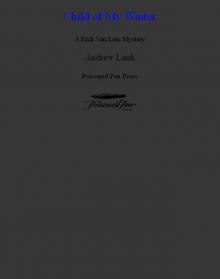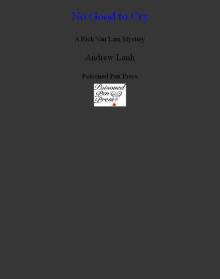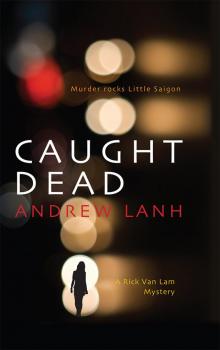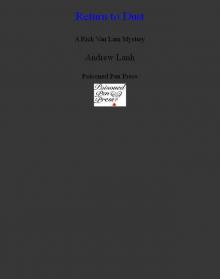- Home
- Andrew Lanh
Child of My Winter
Child of My Winter Read online
Child of My Winter
A Rick Van Lam Mystery
Andrew Lanh
Poisoned Pen Press
Copyright
Copyright © 2017 by Andrew Lanh
First E-book Edition 2017
ISBN: 9781464208492 ebook
All rights reserved. No part of this publication may be reproduced, stored in, or introduced into a retrieval system, or transmitted in any form, or by any means (electronic, mechanical, photocopying, recording, or otherwise) without the prior written permission of both the copyright owner and the publisher of this book.
The historical characters and events portrayed in this book are inventions of the author or used fictitiously.
Poisoned Pen Press
4014 N. Goldwater Boulevard, #201
Scottsdale, Arizona 85251
www.poisonedpenpress.com
[email protected]
Contents
Child of My Winter
Copyright
Contents
Epigraph
Prologue
Chapter One
Chapter Two
Chapter Three
Chapter Four
Chapter Five
Chapter Six
Chapter Seven
Chapter Eight
Chapter Nine
Chapter Ten
Chapter Eleven
Chapter Twelve
Chapter Thirteen
Chapter Fourteen
Chapter Fifteen
Chapter Sixteen
Chapter Seventeen
Chapter Eighteen
Chapter Nineteen
Chapter Twenty
Chapter Twenty-one
Chapter Twenty-two
Chapter Twenty-three
Chapter Twenty-four
Chapter Twenty-five
Chapter Twenty-six
Chapter Twenty-seven
Chapter Twenty-eight
More from this Author
Contact Us
Epigraph
Child of my winter, born
When the new fallen soldiers froze
In Asia’s steep ravines and fouled the snows.
—W. D. Snodgrass, Heart’s Needle
Prologue
Late Saturday night a light sleet pings the old windows of my apartment. Drowsy, I switch on the TV. Midnight: Turner Classic Movies is showing The Deerhunter. Vietnam all over again. It’s a movie I’ve resisted because the fierce gunfire and brutality and napalm-burnt landscapes drag me back to my boyhood at the orphanage in Saigon—Most Blessed Mother Catholic Orphanage.
But I’m a grownup, I tell myself as I wrap myself up in my warm quilt comforter, a birthday gift from Gracie, my landlady and good friend who lives one floor below me. Hot cocoa in a mug, untouched and now filmy and cold.
My eyes keep closing, then opening, tired but strangely alert. Then, horribly, that chilling scene arrives when maniacal Cong guards and the terrorized American GIs play Russian roulette. One bullet in the chamber. Your turn. Fire. Hesitate. Stark horror on the American faces. The demonic faces of the Cong—eyes hard as flint, twitching fingers.
Do it. Do it. Mau di di.
I freeze.
A pistol to the head.
Hurry. Now. Quick. Now. Do it. Move. Move.
Frantically I switch off the TV.
Those horrible words. Mau di di.
Maybe I’m ten or eleven, living in the orphanage since around age five, dropped off by a weeping mother who disappeared into the ruins of Saigon. Not Saigon…Ho Chi Minh City now. Doc lap va Tu do. Independence and Freedom. The words drilled into our schoolboy souls, our morning mantra. No matter because I’m the hated child, bui doi, a child of the dust, awful breed of that frightened mother and some breezy American GI.
Occupying the far back corner of the barracks, my narrow cot under the dripping walls where the mice chatter at night and water bugs crawl onto my eyelids when I sleep, I spend my days dreading the shoving, the sneers. Satan’s child. Mongrel American. Sister Do Thi Bich uses me as a moral exemplum of failure and some sort of original sin. Me, bastard boy.
On a hot August day, so humid my baggy blue shorts and white shirt melt into my skinny body, I line up with a dozen other boys. A fat man with a piercing laugh points us into two old Russian Malotova trucks. Drivers waiting, cigarettes bobbing in their lips. The nun warns us to behave, to follow orders. To listen and obey. She glances at the fat man and smiles nervously. She’s afraid of the Communists, I know. We all are. The North Vietnamese swagger and spit and curse. Men in hard-pressed uniforms stomp into the chapel during services and watch us. The nuns clutch their rosary beads and look into their laps.
We ride for an hour, bouncing in the truck with bad springs. A boy shoves me when my body falls into his, and the others jeer. “The American can’t sit still.”
I push back and we tussle. Someone punches my neck, another pulls my hair. Disorder. The driver hears the commotion behind him and leans on his horn. “If I have to come back there…” He taps the small window behind him with a pistol. We get quiet.
We’re dropped off twenty or so kilometers outside Saigon, near Long Thanh, near old supply buildings, ramshackle structures with rusted corrugated-tin roofs and shot-out windows. A man shambles toward us, lines us up, and announces our work for the day. We will clean the fields around what he calls the depot, gather the scraps of wood and metal and glass scattered around, half-buried or leaning up against the sprawling buildings, haul off debris, and toss it into a truckbed.
“Americans died here,” he tells us. “Cowards.”
He spots me as I lean on one foot, and scowls. “Americans.”
He’s from the north, I know from his rough, unlovely accent, an old crusty veteran from the National Liberation Front. Uncle Ho’s followers. Missing his right arm, he swings his left wildly. A skinny, leather-faced man, shabbily dressed, he stumbles over his words, looks away, then back, each movement of his face a lesson in what’s wrong with war. His shorn head reveals scar tissue and part of an ear missing. One of his eyes isn’t there. “Captain Le. You will call me that.” Then he repeats it. One of the boys snickers and the man jumps so quickly that we all start, nervous. He’s crazy.
While we work, he disappears into a shed, but soon summons two of the boys. They drag an old metal chest outside, snap it open, and Captain Le holds up a military uniform—or the remnants of one. A moth-eaten shirt with stripes on the shoulders. Boots without laces. A helmet.
“An American deserter,” he announces. “A coward.”
At midday, exhausted under the blazing summer heat, we are given water and a bowl of rice. Captain Le disappears for two hours, but when he returns, he’s blind drunk, staggering. His one lazy eye focuses. “American boy, come here.”
As I stand in front of him, he nearly topples, rights himself, but points at me. Broken fingernails, black, chipped. “You tried to kill me.”
I keep my mouth shut, my heart racing.
He turns to the other boys. “When we capture American infidels, we do not kill them. Yes, maybe some torture. A bamboo cage.” A sickly grin. “But we make them into animals.” He reaches back into memory. Then he shouts at me in garbled English:
Xo ren doo dai
Not mu
Xai lon
Go quich
A memorized list of brutalized English commands for the captured American soldiers: Surrender. Don’t move. Silence. Go quick.
He spots the American uniform on the ground. “American,” he y
ells at me, “wear it.”
I don’t move.
“Mau di di.” Hurry. Now. Move.
The other boys, nervous at first, begin to laugh. Tottering, Captain Le yells for them to put the helmet on my head. One of the bullies, thrilled, grabs my arm and twists it. Another grabs my sleeve.
I squirm, fight them, but it’s useless. They lock my arms behind my back. The helmet drops on my head, so large it covers my face. My shirt is torn off, replaced by the wormy shirt. Finally they strap me to a bamboo post jutting out of the ground.
Mau di di. Hurry. Now.
They circle and jab, kick, but then get bored, as the captain demands they get back to work. “You are all lazy. There’s a reason none of you has a mother.” They leave me hanging for an hour, my head dipped from the heavy helmet, my arms hanging by my side. The musty old cloth smells of rat droppings, ancient sweat, decay…
The sun beats on my exposed neck. I pass out.
When a superior drives up, he’s furious, demanding Captain Le release me. I topple to the ground.
Back at the orphanage, delirious, I’m carried to the room where the sick boys convalesce. Alone, writhing, crying, the back of my neck so burned I can’t find a comfortable spot on the cot, I have wild dreams: the American soldier in his uniform looking at me, a maniacal smile on his lips. Mau di di. I can’t lift the helmet off—it weighs a ton. My neck snaps. I hear my mother’s voice as she says goodbye.
When I wake up, sweaty, parched, I look into the face of Sister Mary Chi Hanh. She’s a new nun, the quiet one who always looks nervous. Sitting on the edge of my cot, she dabs my forehead with a damp cold cloth. Seeing me awake, she rushes to give me a sip of water. It dribbles out of the corners of my mouth. When she speaks, she has a slight accent. Maybe French, I think. A whisper.
She anoints my burning neck with lotion, maybe tiger balm, and though I wince and cry, she shushes me.
“The cruel boys…” She is speaking to herself.
I sputter out my name for some reason. “Lam Viet Van.”
“Sssh.”
“My name is…”
She reaches behind her, glances over her shoulder, and suddenly she is placing something in my mouth. “What?” I ask, my tongue rolling over the sweet wonderful taste.
“Chocolate,” she says with a smile on her face.
I swallow it but the smooth taste lingers, welcome, delightful. I grin. “Wow.”
She laughs quietly.
A voice from outside calls her. Alarmed, she jumps up. “I can’t be here.”
“Stay.”
“I can’t, American boy.”
“Stay.”
She sits back for a moment, touches my cheek. “You’ll always be a lonely boy, Viet.”
“What?”
She whispers, “You will always wear the loneliness of the people you meet.”
“I don’t understand.”
“But what you don’t understand is that it’s your gift from a loving God.”
Confused, I stare into her face. “That is not a gift.”
“Our Lord does not make mistakes.”
Chapter One
Anh Ky Trang lived in his own world.
Sometime during the fall semester I spotted the young man sitting alone in a corner of the Student Union, his body angled away from the crowded room, his face buried in a textbook or staring blankly out the window at the campus, his hands folded into his lap. A young man, though I thought of him as a young boy because he was so small and skinny. Once or twice, coming from behind him, I’d see his head follow the movements of passing, laughing students, and when he turned his head I thought I detected eagerness there, a hunger to say something. Maybe simply to have someone talk to him. Loneliness covered him, or maybe I projected that emotion onto him. One time, startled by a group of students who’d bumped into his table, his eyes got hooded, wary.
Lonely. But how was I to know that? Because I also spotted him as Vietnamese—and I suppose I saw myself when I saw him. A boy afraid of others, a boy who felt he didn’t belong in a world where others could point at him and shout, cruelly, Look! There! The outcast.
Stone him.
One day in late September, I thought I’d approach him. I’d been born in Vietnam, I said as I leaned into his table, but he started, his eyes frozen with fear or maybe dread. His lips tightened into a disapproving line, then, surprisingly, into a thin smile, though not a friendly one. I backed off. As I headed to the coffee bar, I watched him gather his books, sling his backpack over his shoulders, and scurry out of the room.
Another time I spotted him heading to class. He hugged the wall, his shoulders dragging against it. His left arm was cradled into his chest, tucked inside his jacket, and his head dipped to the right. Blue jeans, shiny new, but a foot too long, rolled up so that the underside nearly reached his knees. A plaid hunter’s jacket, one side of the tattered collar turned up against his neck. Huge goggle eyeglasses with clunky black frames. A helter-skelter haircut, uneven in places, spiked in the back.
A week later a football lummox, all testosterone and heat, sprinted by, reaching for the waist of a young girl. He bumped into the boy, who jerked back. For a split second his tiny face darkened, his eyes flashed, and that cradled hand formed a fist. A whistling sound escaped his throat. The jock didn’t notice, thank God, maneuvering the willing girl into his sloppy embrace.
What the moment did was make me curious about the lost boy at Farmington College.
Everything shifted at mid-semester when my buddy Hank Nguyen, now a Connecticut state cop, appeared on campus for a six-week, two-hour-a-week semester as part of the State Crimes Investigation course. Teamed with an older lieutenant, the two fielded questions in a practicum for prospective state cops enrolled in the college’s Criminal Justice program. Hank welcomed a return to the campus where he’d been a student a few years back. In fact, the hostile, withdrawn young man who harbored kneejerk bias against me had been my student in Criminal Procedures. Pureblood Vietnamese, though born in America, Hank had inherited his father’s myopic distrust of Vietnamese bui doi like me. Yet, working through his jaundiced view of me, he’d emerged as my buddy for many years now. He was part of my social world—and I was welcomed into his family’s home.
So his stay on campus one night a week was opportune. I’d be finishing my two-nights-a-week course on Forensic Investigations when he’d emerge in his crisp uniform from his classroom, giving us a chance to have coffee or a bite to eat together. My day job was as an insurance fraud investigator out of Hartford, working with Vietnam vet Jimmy Gadowicz in Gaddy Associates, another pal of mine, but my adjunct status at the college provided me a few extra bucks for weekends in New York City or, occasionally, a stolen holiday in Barcelona or London.
Headed into the College Union for coffee one evening after class, I stood at the counter and realized Hank was not behind me. When I strolled back from the counter with two cups of coffee on a tray, Hank had settled into a chair opposite a boy who stared unhappily at the uniformed state cop who was leaning into him and smiling.
Hank motioned me toward an empty seat. “Sit, Rick.” Amazingly, in the minute or so he’d sat there, he’d learned the student’s name. “This is Anh Ky Trang. But he prefers Dustin. The name he gave himself. Dustin Trang.”
He smiled at the boy, who did not smile back. Instead Dustin wore a scared look, his shoulders hunched.
Hank laughed. “He thinks I’m gonna arrest him.”
The boy sputtered, “You are?”
Hank pointed a finger at him. “Why? You commit a crime?”
Dustin actually trembled, but shook his head vigorously back and forth.
“Don’t mind him,” I reassured Dustin, nodding toward a beaming Hank. “He’s a jokester. You’d think a man in a state cop uniform would be better behaved, no?”
Dustin
didn’t say anything.
“Dustin, do you know Rick? Professor Lam? He was my prof a hundred years ago.”
Dustin still said nothing.
“See where you end up when you take my class, Dustin?” I said warmly, but nervously.
Dustin’s head swung from me to Hank, almost mechanically, but miserably.
“A life of crime or a life arresting criminals.” Hank grinned at me.
I downplayed it. “Don’t mind him.”
But Dustin suddenly found a voice. “He’s scaring me.”
That bothered Hank, who lost his smile. “Hey, sorry. Not my intent, Dustin. I saw you, figured you were one of us”—his finger pointed to me and then to himself—“and…” His voice trailed off.
“It’s all right,” Dustin mumbled.
“You a freshman?” I asked.
He nodded. “Yes.” A clipped response, very polite. “Two courses a week.” But he was already standing up, closing his book and tucking it into his backpack. He stepped back. “I gotta go.”
“Hey,” Hank began quickly, “it was good…”
Dustin was already moving away, banging into a chair, hurrying out of the College Union.
“Nice work, Hank. He’s practically running away. You really charmed him.”
Hank, bewildered. “I needed more time.”
“I think your uniform scared him. A cop approaches a solitary boy in a college cafeteria, you know how the story ends—handcuffs, leg irons. Do words like freeze scumbag come to anyone’s mind?”
Hank sat back and folded his arms over his chest. “As I said, I needed more time.” His eyes followed the departed Dustin. “A strange boy, no?”
“I’ve thought so all semester. Lonely.”
“By Christmas we’ll be friends.”
“Maybe you should leave him alone, Hank.”
Hank tilted his head to the side, a mischievous grin on his face. “State cops save the world.” Eyes twinkling. “It’s a bumper sticker I proposed to my captain.”
“No wonder you’re assigned to freshman KP at the college. You know, sometimes the world doesn’t want to be saved, Hank.”

 Child of My Winter
Child of My Winter No Good to Cry
No Good to Cry Caught Dead
Caught Dead Return to Dust
Return to Dust